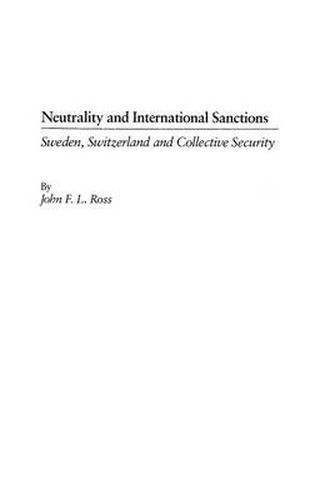Readings Newsletter
Become a Readings Member to make your shopping experience even easier.
Sign in or sign up for free!
You’re not far away from qualifying for FREE standard shipping within Australia
You’ve qualified for FREE standard shipping within Australia
The cart is loading…






A comparative historical study of European neutrality policy with reference to the problem posed to neutral countries by the imposition of international collective sanctions. The study takes the form of a comparative examination of Swedish and Swiss responses to the League of Nation’s embargo against Italy in 1935-36 and the United Nation’s sanctions against Rhodesia in 1965-79. Through this analysis, the author explores how and why Swedish and Swiss policies toward sanctions differed over time and what these differences reveal about neutrality policy in general, particularly in relation to collective security actions taken by international organizations. The book uses an historical approach and compares the two countries not only in terms of their sanctions policies but also in terms of their domestic political structures and individual overall formulations of neutrality policy. Ross aims to demonstrate that despite the many background similarities between Sweden and Switzerland, the two states have differed substantially in their responses to sanctions operations. He analyzes the reasons for these differences, challenging traditionally held views that characterize Sweden’s policies as changeable and Switzerland’s as consistent. Finally, Ross identifies seven explanatory factors, derived from the four case studies, which can be used to determine how other source states - both neutral and non-neutral - might respond to future cases of sanctions.
$9.00 standard shipping within Australia
FREE standard shipping within Australia for orders over $100.00
Express & International shipping calculated at checkout
A comparative historical study of European neutrality policy with reference to the problem posed to neutral countries by the imposition of international collective sanctions. The study takes the form of a comparative examination of Swedish and Swiss responses to the League of Nation’s embargo against Italy in 1935-36 and the United Nation’s sanctions against Rhodesia in 1965-79. Through this analysis, the author explores how and why Swedish and Swiss policies toward sanctions differed over time and what these differences reveal about neutrality policy in general, particularly in relation to collective security actions taken by international organizations. The book uses an historical approach and compares the two countries not only in terms of their sanctions policies but also in terms of their domestic political structures and individual overall formulations of neutrality policy. Ross aims to demonstrate that despite the many background similarities between Sweden and Switzerland, the two states have differed substantially in their responses to sanctions operations. He analyzes the reasons for these differences, challenging traditionally held views that characterize Sweden’s policies as changeable and Switzerland’s as consistent. Finally, Ross identifies seven explanatory factors, derived from the four case studies, which can be used to determine how other source states - both neutral and non-neutral - might respond to future cases of sanctions.